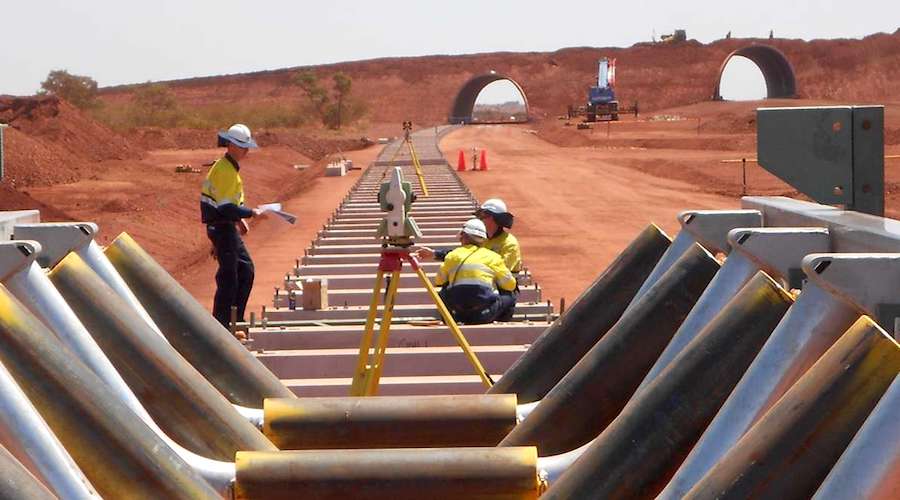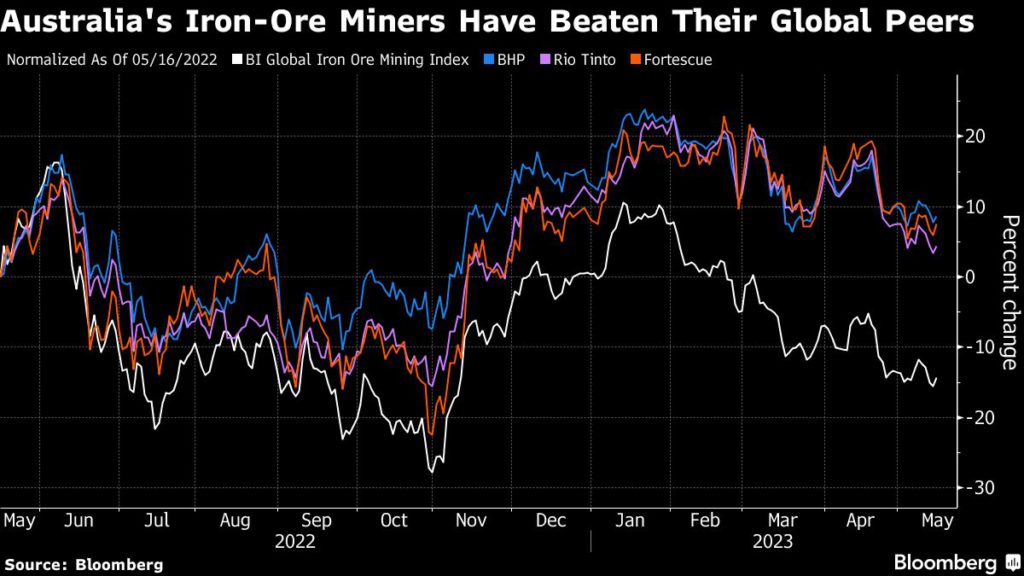Top stock fund wagers BHP, Rio Tinto will weather iron ore slump

A top equities fund manager is backing BHP Group Ltd. and Rio Tinto Ltd., betting they can withstand softer iron-ore prices and will benefit as China’s reopening boosts demand for the commodity.
Australian producers are attractive as they have relatively low operating costs and high exposure to the mainland, the world’s largest consumer of the steel-making ingredient, according to David Wilson, who oversees the equivalent of $5.3 billion at Australia-focused First Sentier Wholesale Geared Share Fund. The fund has returned 10% this year, beating more than 90% of its peers.
Even when iron-ore prices fall, Australian producers are still highly profitable given they have a lower cost base than their global counterparts, Sydney-based Wilson said. “Over the course of this year, China will continue to reopen and that will provide a base for demand for Australian iron ore.”
The fund recently rotated out of aluminum-miner South32 Ltd. and redirected some of that capital toward Rio Tinto, he said.
Iron ore has struggled after a strong start to the year amid concern China’s recovery is losing momentum. Still, Australian miners have weathered the commodity’s gyrations better than most of their international rivals, with BHP, Rio Tinto and Fortescue Metals Group Ltd. outperforming a Bloomberg Intelligence gauge tracking producers of the commodity over the last 12 months.
Even in Australia though, price pressures are building. BHP said last month said it expects iron-ore costs to come in at the top end of its $18 to $19 per ton guidance range in the financial year to June 30, while Brazil’s Vale SA forecasts $20 to $21 per ton for 2023.

While it has recently increased holdings of iron-ore miners, the four largest holdings in Wilson’s fund remain insurer QBE Insurance Group Ltd., oil producer Santos Ltd., gaming-machine maker Aristocrat Leisure Ltd. and industrial property firm Goodman Group.
The fund’s main strategy is to invest in “economically defensive companies that have growth,” Wilson said. Australia doesn’t have “the sort of earnings or economic volatility seen elsewhere. Australia is seen as a bit more of a defensive place, including even our banks.”
Margin pressures
The fund is underweight local lenders as slowing credit growth and margin pressure weigh on their earnings outlooks, Wilson said. Still, the nation’s lenders remain well capitalized and are unlikely to face issues with bad debts, he said, adding that the fund prefers Commonwealth Bank of Australia and National Australia Bank Ltd. to their competitors.
The First Sentier fund has handily beaten the benchmark S&P/ASX 200 Index this year, with the gauge rising just 2.3%.
The fund also owns technology shares such as logistics-software company Wisetech Global Ltd. and online property-listing service REA Group Ltd.
“People, when they think of tech, tend to think of obviously the US,” Wilson said. “But Australia, over a long period of time, has been able to develop quite solid tech companies.”
(By Georgina McKay)
More News
Contract worker dies at Rio Tinto mine in Guinea
Last August, a contract worker died in an incident at the same mine.
February 15, 2026 | 09:20 am
{{ commodity.name }}
{{ post.title }}
{{ post.date }}




Comments